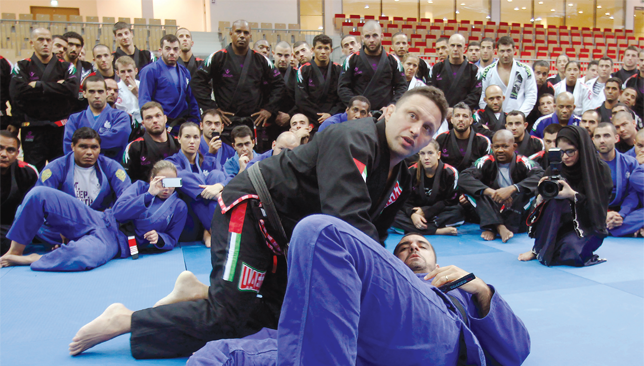
Renzo Gracie is steeped in jiu-jitsu, a sixth-degree black belt testament to a lifetime’s dedication.
Abu Dhabi is a city close to the 47-year-old’s heart, after making his Ultimate Fighting Championship debut there in 2010 and training General Sheikh Mohamed Bin Zayed Al Nahyan, Crown Prince of Abu Dhabi and Deputy Supreme Commander of the UAE Armed Forces and Chairman of the Abu Dhabi Executive Council.
The Brazilian returned to Abu Dhabi last week to lead a seminar and told Sport360° about jiu-jitsu, his academies, UFC and who his favourite football club is.
Tell us why you’re here in Abu Dhabi?
I was invited by the UAE Jiu-Jitsu Federation (UJJF) to do a seminar for black belt competitors and coaches. It was a success, with 250 people coming and that shows the beauty of the sport. The seminar was about getting united as a group, because the UAEJJ are teaching the sport to children and developing and expanding the sport in other parts of the country. It was a way for them to see new techniques, learn new point of views, new way to do things and a chance to evolve the sport.
What types of tips or advice did you give them?
We exchanged knowledge, tips on how to do things better for everyone in the interest of jiu-jitsu. I had the opportunity to work with the grown-ups and kids at schools, and it’s amazing to see the path they’re going at. The coaches are teaching the structure very young and I saw them doing the work and it’s a unique experience.
You have visited Abu Dhabi many times. Looking back, how much has the sport improved?
It’s been amazing. With the backing of Sheikh Mohamed, jiu-jitsu continues to grow.
You have now started opening academies worldwide. How is that going?
It’s going very well. Financially, it’s doing great.
When I began the sport, the profile of jiu-jitsu was very small. Now the sport has risen.
I have my own academy in New York with 1,300 students and I concentrate on them, developing them to become competitors and instructors in the future to let them spread the beautiful sport of jiu-jitsu. I also have academies New Jersey, Israel, Japan and the Netherlands, which I visit regularly.
What made you decide to open academies?
An academy is a centre where you teach people of the sport but at the same time generate money as an income. It’s the best way to congregate a huge number of people to learn the sport, which is good for the overall development.
In some parts of the world, jiu-jitsu isn’t very popular.
What do you do to ensure you promote the sport?
We promote it a lot, through fights and seminars, and it’s now picking up. If I was in charge of a football organisation, I would be getting worried because it’s becoming very strong.
What made you start practicing jiu-jitsu?
It came from my family. My father practised the sport, and for me it was natural. It was part of my natural living. I never saw life without jiu-jitsu and for me it’s my favourite sport. I don’t remember one day in my life that my father played with me that wasn’t a jiu-jitsu fight.
You also competed in UFC as well. Are there any similiarities between that and jiu-jitsu?
It’s basically the same. You put the same number of hours of training and the rules change a little bit. I honestly believe jiu-jitsu is the most efficient way of preparing for any fight.
Any fighter in UFC who cannot do jiu-jitsuwill lose easily. It’s because you need to know submissions and learn how to defend.
You competed in UFC in 2010 at Abu Dhabi. How was that experience?
It was great. I was invited to fight five months before the fight and I hadn’t trained for three years. I liked the city. I won two major world championships in Abu Dhabi and I loved the experience.
Any hopes of returning to UFC?
I will be hoping to fight soon. I will probably compete again at the end of this year or beginning of 2015. I like the sport and competing is the most important thing a fighter can do. You learn things even if you lose.
You also coached Sheikh Mohamed in the late 1990s.
Yes, he’s a very intense guy. He’s smart and has a lot of heart. When he fights, he fights. He has will, which is the most important thing a fighter needs to have. His passion for jiu-jitsu is helping making the sport big in the UAE.

Besides martial arts, what are your hobbies?
I like surfing because I used to do alot in Brazil.
I like playing football, and have played volleyball with Sheikh Mohamed – he’s a very good player. I support Manchester City because I saw the profile of the club grow since the Abu Dhabi takeover. They have signed good players and built a fantastic club.
Now there is a partnership with New York City (Major League Soccer club) and that is close to where I live, so I will be watching them. I also like to read in my pastime. I’ve read all the books of Malcolm Gladwell, and read Brazilian books.
Did you watch any of the World Cup games?
Yes, I saw a lot of games. I saw the Brazil v Germany semi-final, and said before the game that we were going to lose. I thought the Germans went light against Brazil. They could’ve won 15-0, and definitely the best team won the match and the tournament.
What are your favourite places to visit in Abu Dhabi?
I like the Sheikh Zayed Grand Mosque and the desert. Everything here is unique, the food, the people, and I always miss the city.